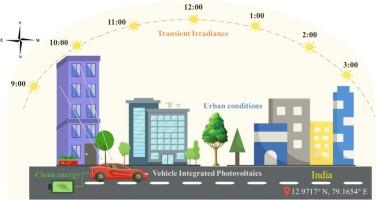评估车辆集成光伏技术在城市驾驶条件下的应用范围 - 印度南部二级城市的案例研究
IF 7.1
2区 工程技术
Q1 ENERGY & FUELS
Sustainable Energy Technologies and Assessments
Pub Date : 2024-11-04
DOI:10.1016/j.seta.2024.104040
引用次数: 0
摘要
乘用车集成光伏(VIPV)技术是实现可持续交通脱碳的一种有趣方法。在增长较快的经济体中,VIPV 被认为是一种车载能源。文献报道称,在印度城市的低纬度热带气候地区,VIPV 的应用范围相对较小。在本研究中,对位于印度南部泰米尔纳德邦的二级城市韦洛尔(12.9717°N,79.1654°E)的城市布局进行了实时实证评估,分析了车辆行驶过程中的太阳辐照模式。研究在每年秋分季节的上午 9:00 至下午 3:00(印度标准时间)之间进行,每天往返六次。在每个行驶周期中,研究了车辆与连续太阳路径的相互作用,以及影响车顶、引擎盖和垂直表面的每小时瞬态辐照(TI)模式。在城市场景中,由于建筑物和障碍物的阴影阻碍,瞬时辐照度明显下降。结果得出结论,在分析条件下,VIPV 客车每天可产生 1.03 千瓦时的总能量,促进 9.47% 的能量抵消,可将车辆的行驶里程增加 11 公里。本文章由计算机程序翻译,如有差异,请以英文原文为准。

Assessing the scope of vehicle integrated photovoltaics in urban driving conditions – Case study of a Tier-II city in southern India
Vehicle-integrated photovoltaics (VIPV) technology for passenger cars is an interesting approach to achieving decarbonization in sustainable transportation. The eminence of VIPV is ascribed in faster growing economies as an on-board energy source for cars. Literature reports that the scope of VIPV is relatively unexplored in low-latitude tropical climatic regions of urban India. In this study, a real-time empirical assessment is performed to analyse the solar irradiance patterns over a vehicle driven in the urban layout of a Tier-II city of Vellore (12.9717°N, 79.1654°E) located in Tamil Nadu, southern India. The study was performed for six round trips in a day between 9:00 a.m. and 3:00p.m. (IST) during the autumn equinox season of the year. The vehicle’s interaction with an incessant sun path and hourly patterns of transient irradiation (TI) impacting the roof, bonnet, and vertical surfaces were investigated for each drive cycle. A significant drop in TI was observed by the shadow hindrance from buildings and obstacles in the urban scenario. Results conclude that a VIPV passenger car can generate an overall energy yield of 1.03 kWh per day, fostering an energy offset of ∼ 9.47 % that can enhance the vehicle’s drive range by ∼ 11 km in the analyzed conditions.
求助全文
通过发布文献求助,成功后即可免费获取论文全文。
去求助
来源期刊

Sustainable Energy Technologies and Assessments
Energy-Renewable Energy, Sustainability and the Environment
CiteScore
12.70
自引率
12.50%
发文量
1091
期刊介绍:
Encouraging a transition to a sustainable energy future is imperative for our world. Technologies that enable this shift in various sectors like transportation, heating, and power systems are of utmost importance. Sustainable Energy Technologies and Assessments welcomes papers focusing on a range of aspects and levels of technological advancements in energy generation and utilization. The aim is to reduce the negative environmental impact associated with energy production and consumption, spanning from laboratory experiments to real-world applications in the commercial sector.
 求助内容:
求助内容: 应助结果提醒方式:
应助结果提醒方式:


